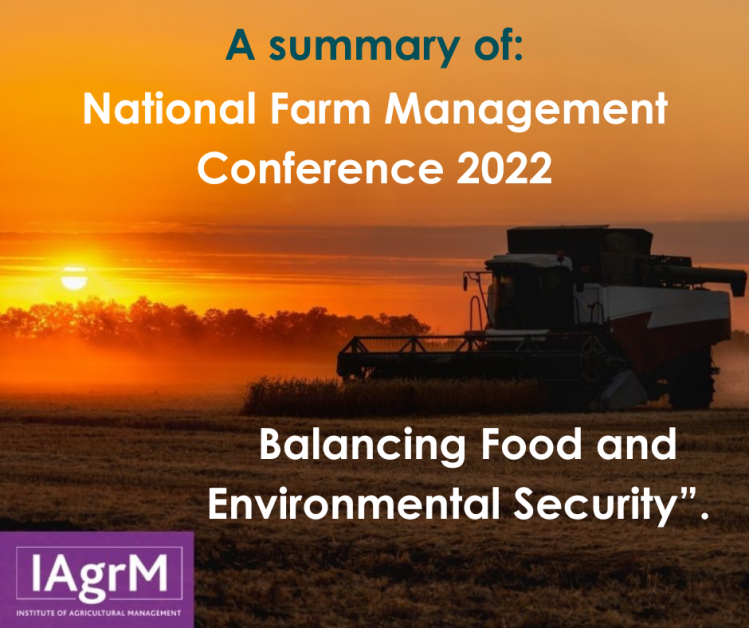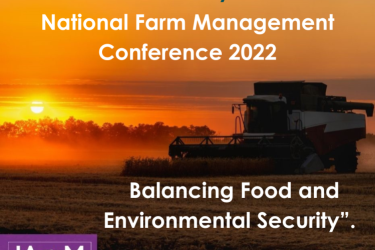A view from the National Farm Management Conference
By Edwin Reyes, Agri-food Consultant
On 1st November, the IAGRM – The Institute of Agricultural Management hosted the National Farm Management Conference in the QE II Centre in London. A record number of more than 400 members of the IAGRM and guests attended.
The theme of the day was the topic “Agriculture’s Defining Decade: Balancing Food and Environmental Security
This event was an excellent opportunity for the UK agriculture sector to get together to discuss current problems, share experiences and propose new strategies for an industry currently facing an array of challenges.
The event featured a wide variety of speakers, including Lord Deben (the Chair of the Climate Change Committee and former Minister of Agriculture and Environment Secretary), Minette Batters (President, National Farmers Union), Sophie Throup (Head of Agriculture, Fisheries & Sustainable Sourcing, Morrison Supermarkets) and Steve Maxwell (CEO, Worldwide Fruit). Welsh dairy Farmer Abi Reader and New Zealand goat Farmer, Matt Bolton were also speakers, among many others.
Despite the diverse backgrounds and areas of interest across the speakers, some of their observations displayed strong areas of similarity. Amongst these were as follows:
DISRUPTION AND CHANGE
- The whole of the UK , including the agricultural sector is going through a period of huge change. The whole supply chain needs to adapt to new market conditions, although the harsh reality is that it is difficult and presents many challenges. For some though, it will of course present opportunities too.
- Some of the changes being experienced in the sector today are a consequence of factors which have been impacting on farmers for some years already. For example, the effect of climate change is making agricultural production more difficult and uncertain. More recent issues are Brexit, the COVID pandemic and the ongoing the conflict in Ukraine.
- These issues are having a huge impact on vital areas to farming such as labour, production inputs (e.g. fertilizers/energy), logistics and widespread supply chain disruption.
FOOD SECURITY
- The UK’s food security has brought agriculture and its role in society to the forefront of the debate. Food security is intrinsically linked to social and economic security. New legislation needs to bring positive change to the agricultural sector and address our high reliance on imports.
- To improve UK food security, we must have sustainability as the focus. This is not only about the environment, but has a multidimensional component that also includes important social factors such as development, health and culture
NET ZERO/ CLIMATE CHANGE
- When talking about the UK and its net zero ambitions, the challenges include having a common language, establishing a baseline of the current environmental conditions and set realistic objectives that can be measured to evaluate the success of the new practices/strategies. Although there is encouraging progress in the UK, this is not consistent across the devolved nations
- Climate change is closely related to the cost of living crisis and international relations. Reducing food waste will benefit both climate change and the cost of living.
- The consumer also has a responsibility; their decisions affect the environment, but they must have the tools to help make better/more informed decisions (i.e. labelling/provenance, etc.). Diets need to change rapidly to not only improve health but also food security and climate change impact.
SUPPLY CHAINS
- To achieve sustainability goals, (and improve food security) supply chains need to embrace collaboration and innovation. The government must also provide a clear policies and frameworks so producers, processors, retailers and consumers can make well informed decisions
- Reducing emissions in supply chains can deliver cost saving benefits for the farmer – all the way along the supply chain to the consumer.
- We should be striving for low impact food systems – shorten and make supply chains more diverse. For this to happen, science, industry and politics must work closely together. Devolve more power to regional areas could help to solve this problem.
WHERE NEXT?
- Technology plays a major role in helping to solve the dual challenges of food security and sustainability, but this must not be seen as displacing traditional agriculture, but complementing the good practices and improvements already seen in the farming industry.
- Agricultural resilience can only be achieved through economic resilience and financial sustainability. Collaboration and engagement between the private and public sector will be key.
Is this agriculture’s defining decade – most likely! Getting the balance between food and environmental security will be at the centre of this – Embrace change and opportunity.
Edwin Reyes is a Consultant with Promar International, the consulting arm of Genus plc. He works across the full value chain on assignments, at the moment, in the UK, US, Colombia, South Africa and the EU. Promar is a long-term supporter of the IAGRM National Farm Management Conference going back over 20 years.






